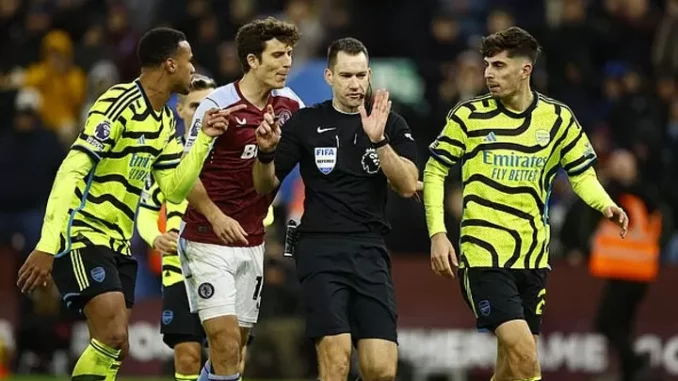
Howard Webb explains why VAR ruled out Arsenal goal vs Aston Villa
The PMGOL’s chief referee, Howard Webb, explained why Kai Havertz’s late goal against Aston Villa was disallowed by VAR. It looked like Matty Cash was the first to touch the ball with his hand before the Arsenal midfielder handled it as well.
The Gunners’ dismal performance saw them lose for just the second time this Premier League season, falling from top to second place in the standings as Liverpool edged past Crystal Palace to win all three points. With the victory, Unai Emery and company are now only one spot and point behind Arsenal in third place.
The Villans got off to a fine start with John McGinn netting after just seven minutes. From here on in, though, the Gunners took control of the game but couldn’t manage to find an equaliser despite generating 1.40 expected goals compared to Villa’s 0.57.
READ MORE: All The Big Decisions That Went Against Arsenal During 1-0 Defeat To Aston Villa
Havertz’s close-range goal appeared to give Mikel Arteta’s team a late level for a brief period, but referee Jarred Gillet promptly ruled the goal out after seeing a handball. The VAR review revealed that, in addition to striking the German’s hand, the ball had also struck Cash, the defender for Villa, in the arm.
VAR stuck with the onfield decision, ruling out the goal, and so Aston Villa picked up all three points. There has been some fall-out since, with Arsenal fans questioning why only their player was punished despite both footballers using their hands inside the penalty box.
Why VAR ruled out Havertz’s goal vs Aston Villa
Sky Sports Premier League have since released footage which reveals audio and footage of the process made by the VAR team live during the incident. On top of that, former referee Webb has explained why the officials came to the right conclusion. He first explained why Havertz was penalised:
“The law states that any contact with an attacker’s hand or arm, even accidental, which then leads to a goal being scored immediately has to be penalised. And this is actually a really good on-field decision by the referee, Jarred Gillett, in that respect. The law requires him to penalise when he sees that contact on Kai Havertz’s arm.
“It’s not intentional, but it still has to be penalised. I think the idea was that if it comes off the arm, it can’t be a fair goal – that was the reason why this law came in. But we see this kind of situation leading to a goal disallowed when it hits Havertz’s arm and yet a few seconds earlier, it hits Matty Cash’s arm as well – equally accidentally – but he doesn’t get penalised.”
The rule which allowed Matty Cash to use hand vs Arsenal

Webb then went on to detail why the rule allows Cash to use his hand here in such a manner and still escape punishment.
He said:
“He can’t be penalised, because he’s got to commit a different offence as a defender – he’s got to make himself unnaturally bigger or deliberately handle the ball. He does none of those, so it’s correct not to penalise, but we’re working with a different threshold for the attacker. It hits Havertz’s hand, and we have to disallow the goal in this circumstance.
‘This law has been in place for, I think, about five years now. It was decided by the International FA Board [IFAB], through their consultation, that goals that are scored off the arm are not fair, and therefore this law came in. The laws are always under review, maybe it will change, but in this circumstance, the referee did absolutely the right thing.
“And then once the on-field decision has been given as a disallowed goal, then the VAR checks the footage, just to make sure the referee has not mistakenly seen a contact on the arm. In that case, the goal should stand, if it’s only hit the body.”
Read more on sportupdates.co.uk
Join our Facebook group for more updates click here to join.

Leave a Reply